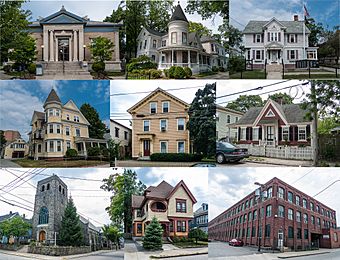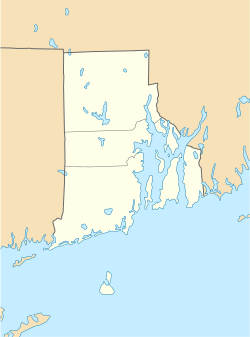South Central Falls Historic District facts for kids
Quick facts for kids |
|
|
South Central Falls Historic District
|
|

Contributing properties to the South Central Falls Historic District, photographed in 2013
|
|
| Location | Central Falls, Rhode Island |
|---|---|
| Area | 55 acres (22 ha) |
| Architect | Multiple |
| Architectural style | Colonial Revival, Greek Revival, Late Victorian |
| MPS | Central Falls MRA |
| NRHP reference No. | 91000025 |
| Added to NRHP | January 31, 1991 |
The South Central Falls Historic District is a special area in Central Falls, Rhode Island. It's like a time capsule, showing how people lived and worked long ago. Most of the buildings here are homes. They were built a long time ago, mostly in the late 1800s.
This district is located in Central Falls. It's bordered by Broad Street to the east and Dexter Street to the west. To the south, it touches the city of Pawtucket, Rhode Island. To the north, you'll find Rand Street and Jenks Park.
Contents
Discovering the South Central Falls Historic District
This historic district is home to 377 important buildings. Most of these buildings were constructed before 1920. Because of its history, the district was added to the National Register of Historic Places in 1991. This means it's recognized as a place important to the history of the United States.
What Kinds of Buildings Are Here?
Even though most buildings are homes, the district also has other interesting structures. You can find places of worship, schools, and even an old factory. These buildings show the different parts of life in the past.
Old Factories and Churches
There's one old factory building called the Hemphill Mill. It's a four-story brick building from 1909. It's on Dexter Street.
You can also see three church buildings. Two of them are still used as churches today. St. George's Episcopal Church is a stone church built in 1922. Another church building, made of wood, is at 161-165 Cross Street. It was built in 1893 and has been home to different church groups over the years.
Schools and Libraries
Two old school buildings are still standing. One is the Central Street School. It's a wooden building from 1881. It's so important that it's also listed separately on the National Register.
The current Central Falls City Hall was once a high school. It's a large brick building built in 1889. Back then, this area was part of Lincoln, Rhode Island. The Adams Library building is another important structure. It was built in 1910 and has a classic, grand style.
Homes of the Past
Most of the homes in the district are made of wood. They usually have one to three living spaces. These houses were often built for workers. They have simple designs, but many show styles popular at the time. For example, some have "Italianate" touches, which were common when the area first grew.
It's rare to find very large single-family houses here. One of the most famous large homes is the Samuel B. Conant House. It's a "Colonial Revival" style house built in 1895. It was built for a man named Samuel B. Conant, who owned a print shop in Pawtucket.
 | Jackie Robinson |
 | Jack Johnson |
 | Althea Gibson |
 | Arthur Ashe |
 | Muhammad Ali |



